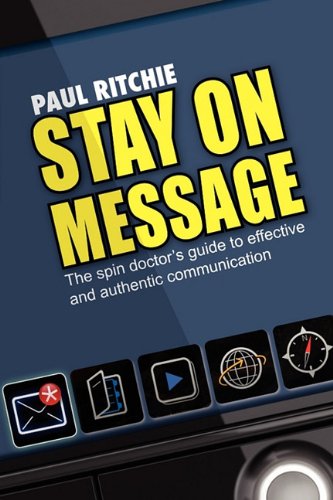Stay on Message
By Paul Ritchie
(Vivid Publishing, 2010, 240 pages)
 Being a ''spin doctor'' must be among the world's least trusted professions. No one likes ''spin''. It lacks authenticity and is used to evade the truth and avoid disasters.
Being a ''spin doctor'' must be among the world's least trusted professions. No one likes ''spin''. It lacks authenticity and is used to evade the truth and avoid disasters.
But if you are interested in practicing the dark arts of ''spin'', you shouldn't avoid Stay on Message.
To be fair, Stay on Message is not a ''spin'' bible. Instead it is rare guide on the skills and techniques on how to communicate effectively.
How individuals use these skills is up to them.
Paul Ritchie's Stay on Message, if properly absorbed, provides a digestible guide for everyone who needs to learn the art of effective communication -- both new and seasoned.
The book mixes stories of Ritchie's long experience in politics and public debate with the tools and skills he developed to survive these roles.
A core message of the book is that there can be a large difference between what people communicate and how it is received. And the capacity to ensure these align is central to effective communication.
Ritchie identifies his point early by outlining the difference between messages carried by a ''spin doctor'' and a public relations professional.
Despite both seemingly being the same profession, perceptions of who is communicating (spin doctor vs PR professional) radically impact how messages are received based on perceptions and connotations associated with those professional titles.
Ritchie then continues by articulating the rules of a good message from its simplicity, to the conviction and authenticity of those delivering it, to the necessity of understanding the audience to which it is communicated.
Much of Ritchie's book is not new.
Many of the tools and skills he promotes can be developed intuitively by communications professionals through practice.
The contribution he has made is to break them down into bite-size lessons that can inform those seeking to get their message across.
No doubt anyone who thinks they can read Ritchie's book and become a professional communicator are wrong.
Like all skills, practice improves an individual's capacity, and from the examples he uses Ritchie himself exemplifies this point as someone who understands, but occasionally fails in his attempts to communicate successfully.
Perhaps the most entertaining story was the time his own shortcomings resulted in a letter nearly being distributed during the 1993 federal election, from the then leader of the opposition, John Hewson, to marginal electorates.
The letter ended with a statement from Hewson that ''if you elect me next Saturday, I will restore the recession and end hope for our country. This is my pledge to you.''
Thankfully, for Ritchie's own sake, the letter was never distributed to the intended swinging voters.
Laden with examples, Ritchie successfully provides context and evidence to back up his arguments.
He correlates his points with real-world examples from Winston Churchill's speeches to stir a nation's attention to the ''Nazi menace'', and Barack Obama's harnessing of his endorsement speech for then Democrat presidential candidate, John Kerry, to suit his and Kerry's ends.
Even seasoned media professionals will take away gems from Ritchie's insights.
He usefully provides checklists at the end of every chapter which provide a digest and, consistent with his own advice, ensures ''the message'' is repeated at length.
Probably Ritchie's most important contribution is his discussion on the use of social media.
There is still relatively little written about the use of social media as a communication tool as companies and politicians continue to bumble through with boring tweets and stiff YouTube videos.
While Ritchie seeks to shine a torch light on the technology, the reality is that, apart from its dynamism and the necessity to be aware of the millions of new potential journalists with a mobile phone connected to the network, the only certainty is that it will keep changing.
No comments:
Post a Comment